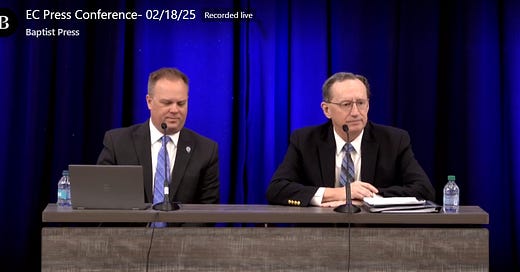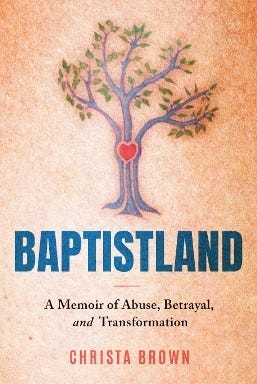Southern Baptist CEO Says Sexual Abuse Database Is "Not a Focus"
But I wonder... how long was it all a charade?
After years of trailing out hollow words, impotent task forces, and phony dog-n-pony shows of purported reform, the Southern Baptist Convention’s top CEO straight-up admitted that a database of clergy sex abusers is “not a focus for us.”
That tiny bit of truthfulness comes to us thanks to Bob Smietana of the Religion News Service who asked this question about the database at the SBC Executive Committee’s press conference last Tuesday:
“Will there be any names on that by the summer? Do you anticipate in the future having names on that or is that really a dead option at this point?”
Jeff Iorg responded:
“It’s not a focus for us at this point.”
Nothing to see here; we’re moving on.
So, even though a database of convicted, admitted and credibly accused pastors is what thousands of Southern Baptist delegates (“messengers”) voted for in 2022, it’s now obvious that, despite the repeated promises and all the institutional showmanship, it’s not going to happen. Certainly not any time soon.
Institutional record-keeping and information-sharing on credibly accused abusive pastors is simply not a priority for those who actually hold power in this recalcitrant faith group.
The will of the messengers be damned. Not to mention the safety of kids and congregants.
Of course, I’m not surprised by the substance of Iorg’s admission. I’ve long viewed all the SBC talk-talk-talk on sexual abuse reform as being about 95% posturing and puffery – like a slow-motion performance on a stage and all for the sake of institutional image. Absent real-deal deeds, I was never going to cheer for their empty talk.
But here’s what I wish I could figure out: When exactly did the SBC’s proclaimed plan to build a denominational database become a denominational sham?
They say it’s “not a focus…at this point,” but was it ever a focus? Or was it always a charade?
(A bit of history: The Executive Committee spun this no-database decision by saying that, instead of a denominational database, they would provide better resources to churches and teach them to use existing criminal databases and do background checks. This sounds like a repeat of 2008 when, despite the messengers’ vote for a study on having a database, the Executive Committee simply declared “no database” after doing nothing that resembled what any ordinary person would deem a legitimate study. Instead, it bragged about offering new resources to churches (a glossy brochure!) and urged them to do background checks and to use the Department of Justice’s database of convicted sex offenders. And ironically, that wasn’t the only incredibly bad decision of 2008. That same year was when the SBC elected Johnny Hunt to be its president. Now, after being named in the Guidepost investigatory report for alleged sexually abusive conduct, Hunt is suing the SBC, seeking $100 million in alleged damages to his reputation and livelihood.)
Who conceived the database charade?
With some of the SBC’s Executive Committee members, I suspect the proclaimed plan for an SBC clergy sex abuser database was always a charade. From the get-go, they were intent on stalling and blocking its development.
But those are merely the ones who are obvious – the ones who have always balked at even admitting to a widespread sexual abuse problem in the SBC, much less to actually reckoning with it.
With other SBC and SBC-adjacent folks – including some of the members and advisors who served on those “non-event” task forces – I suspect they may have simply been too naïve and too trusting to let themselves see the reality of what was going on.
And that’s a shame, because they were the very people who were supposed to be advocating for survivors, and instead it seems they wound up functioning as pawns to prop up the institutional charade.
Then again, for some other SBCers, I think we have to accept that, sometimes, those we imagine as “good people” aren’t really so good.
Who believed this charade?
From the get-go, it appeared that the abuse reform task force was designed for failure. It was run by volunteers who were given no significant funding, no staff, and no power. So, of course, nothing would get done. That’s the nature of how the world works.
To think otherwise would be like refusing to believe in gravity. I wasn’t capable of it.
But many were. I think there’s something about evangelicalism that inculcates in many a tendency toward magical thinking.
Maybe that’s why multiple people referred to the “launch” of the database as a “historic” moment… even though it held not a single name of any abusive pastor. To me, it looked orchestrated, as though they had all heard the same coaching – “call it historic” – even though it was, in reality, just an empty shell of a website.

Maybe that’s also why some survivors were reported as “shedding tears” as they “celebrated the progress” the denomination had made when the database’s website went live… even though it held not a single name. (Again, to me, the scene sounded orchestrated, and it certainly served as a stellar piece of free PR for the SBC.)
So many people wanted so desperately to believe in the “launch” of the database that reality simply went by the wayside.
That’s what I believe is true for at least some of them. They were pawns in an institutional charade, but unwittingly so.
Yet clearly, there were others who, at some point, realized that “nothing will change.” One former task force member flat-out said so.
Did others realize it, too? When?
And if task force members and advisors realized “nothing will change,” why didn’t they say so publicly, refuse to be part of the institutional charade, and put an end to the pretense?
Were they witting or unwitting in their roles in the charade?
When did the Executive Committee’s focus shift? Or did it?
When exactly did SBC leaders decide that the database is “not a focus”?
And what exactly was their decision-making process? Or should we just assume that the archangel Gabriel spoke to them and proclaimed “no database” as God’s will?
But seriously, at what point was the database a genuine focus for them? Was it ever?
The very fact that the abuse reform task force was apparently designed to fail suggests that, from the get-go, the database was also designed to fail, which suggests that this charade was in motion from way back.
In the wake of the Abuse of Faith exposé and the Guidepost investigatory report, the SBC’s narrative of “we’re making a database” helped to present an image to the world of a responsible institution that was trying to rectify its wrongs and prevent abuse. It served their institutional ends because keeping the charade going helped to keep the dollars flowing. So, for nearly three years, the SBC maintained that phony narrative and benefitted from it.
Now we know it’s not true. The database is “not a focus.”
I’m grateful to finally have this tidbit of truthfulness – the incessant gaslighting about the database can now end – but still I keep coming back to the question: When exactly did the Executive Committee decide “it’s not a focus”?
For how long were they just leading us all on?
Next up: The SBC’s sexual abuse hotline. Who does it serve?
For more on the ruses and maneuvers of the Southern Baptist Convention, check out my book, Baptistland: A Memoir of Abuse, Betrayal, and Transformation.






No surprises, just endless disappointment and grief. I think your note about magical thinking perfectly encapsulates the problem with everyone still genuinely trying to help the SBC--and countless other corrupt religious orgs--do the right thing: they have endless imagination in only one direction, the one that entails the salvation of their beloved institutions. None of them are brave or curious enough to imagine a bright future where these orgs have burnt to the ground, where their power over the people has ended, and where their leaders have gone down with the ship.
Disgraceful. The investigation yielded results far worse than most people expected. What should we do about it?
Nothing.
ok….